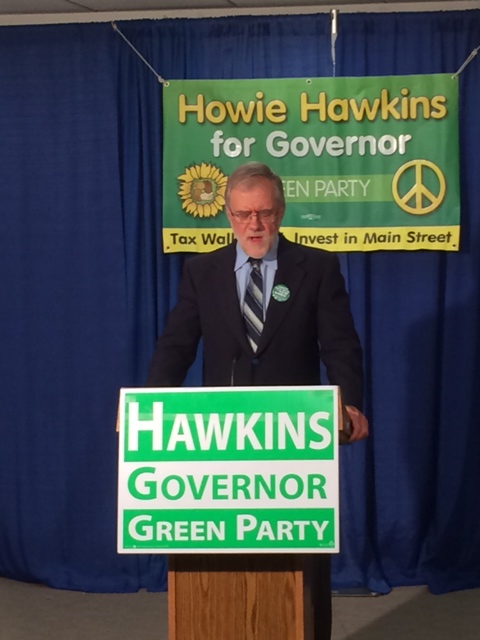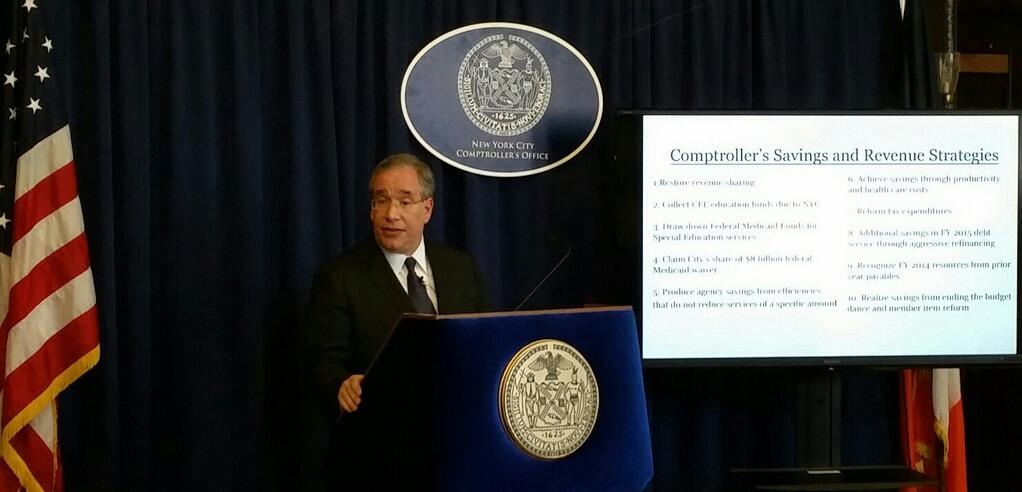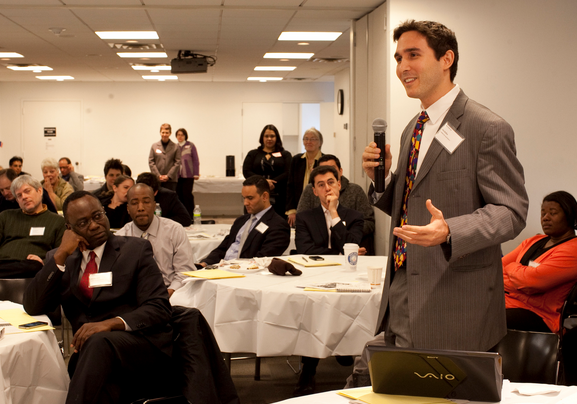
NYCEDC President Kyle Kimball (purple tie) at a ribbon cutting in Bedford-Stuyvesant (nycedc.com)
During an early mayoral debate, then-public advocate Bill de Blasio gave the Bloomberg administration an 'F' for its efforts to advance minority and women-owned business enterprises (commonly known as M/WBE). De Blasio criticized further, saying, "We certainly don't see an administration that, in its composition, looks like New York City."
After winning the race to replace Bloomberg, Mayor de Blasio took to the inaugural podium outside City Hall on the brisk, winter morning of January 1st, 2014 and promised that his mayoralty would be a progressive and diverse chapter in New York City's history. "Black, white, Latino, Asian, gay, straight, old, young, rich, middle class, and poor," he said. "A city that remembers our responsibility to each other — our common cause — is to leave no New Yorker behind."
De Blasio heeded his own call, quickly beginning to build a government that was notably varied in race and gender, especially within his inner circle. But, as the new mayor built a diverse administration and heralded the public sector's duty to combat inequality and injustice, his previous hunch appears true to date: the contracts existing between the city's bureaucracy and its businesses do not reflect a commitment to diversity.
"In Fiscal Year 2013, the City procured $16.5 billion worth of goods and services and only $439 million went to M/WBE - a mere 2.7 percent," said Michael Nitzky, the director of communications for Comptroller Scott Stringer. "That's simply unacceptable."
As the Mayor's Office of Contract Services's website states, "Whether it's biodiesel fuel for City vehicles, trucks to clear our streets, or fresh produce from local farmers, agencies are constantly procuring to serve the public." For thousands of companies in New York City, obtaining a city contract is one of the most important financial benefits of civil government. Last fiscal year alone, roughly 40,500 transactions between the public and private sectors translated into this $16.5 billion in revenue for vendors. And yet, in light of the numbers and goals set forth, a stark divide is still apparent when it comes to contracts with M/WBE.
In total, M/WBE made up 7 percent of New York City's vendors in 2013 and, last year, 23 percent of the City's sub- and prime contracts went to M/WBEs. However, given the miniscule dollar figures of these contracts, 23 percent is not necessarily indicative. And it hasn't been for some time, even as city agencies continue to place a huge emphasis on diversity in dollars.
In the 1989 case of City of Richmond v. J.A. Croson Co., the Supreme Court ruled that in order to establish an M/WBE program, a municipal government needs to show statistical evidence of a disparity existing between businesses owned by men, women and persons of color - a prime example of the cost/benefit re-analysis of welfare and social services retained throughout the Reagan Years. Also, to equalize the playing field, the program goals must be specific; city agencies have to name an exact percentage to aspire to, a figure for city contracts which could determine how much money is going to M/WBE.
So, in 1992, New York City Mayor David Dinkins made it so: the city's first African-American mayor also created the first-ever M/WBE program in New York City, tasked, through executive order, with securing 20 percent of all city contracts for M/WBE. With it, the city could award contracts to M/WBE if their bids were less than 10 percent higher than the lowest bid. Also, the names of these businesses would be entered into a database for bids, giving them a leg up in the procurement process. The result? In 1993, M/WBE accrued $270 million in contracts from the city and, between 1990 and 1994 the percentage of these pacts jumped from 9% of the city's contracts to 17.5%.
Then, in 1993, Rudy Giuliani was elected mayor. The Republican mayor-elect argued the program was "reverse discrimination" and "bad social policy" targeting white men, and it ended soon after.
It wasn't until 2003 - nearly ten years later - when Mayor Michael Bloomberg would revive M/WBE programming as a means of diversifying New York City's economy. In the Bloomberg program, the blanket 20 percent for all agencies was replaced with specific pegs set for each type of contract and their respective agencies, for contracts up to $1 million. For example, in accordance with the law, which was passed in 2005 and then amended in 2013 to effectively remove the cap, 12.63 percent of construction contracts under one million dollars were meant to go to African-American-owned businesses.
Even as the actual number of contracts failed to budge much, the former mayor touted citywide success in other statistics, like the fact that, between 2007 and 2013, the number of certified M/WBE rose from 700 to 3,796, earning some $3 billion over that time period. However, success looks different on paper: as shown through the excellent work done by Adam Wisnieski for City Limits, the city continues to fail to meet each and every one of its goals annually. That 12.63 percent goal for African-Americans in construction contracts? Last year, the number was 2.36 percent. And, between 2010 and 2011, the number of M/WBE contracts actually decreased.
It's New York City in 2014. Why the disparity?
With the system in place, The City cannot simply hand over contracts to M/WBE to meet its own goals - it must, by law, pay the lowest responsible bidder, in the hopes that these bidders, more times than not, will be M/WBE. That being said, M/WBE have no advantage in the race to the top of the list, especially one that has been heavily regulated in light of recent payment scandals like CityTime and the 9-1-1 overhaul. And, to Ashley Emerole, former senior analyst at the Office of Management and Budget,, therein lies the problem.
"I think first and foremost the procurement process is cumbersome and arduous. This impacts anyone trying to do business with the City," said Ms. Emerole. "The series of checks and balances meant to prevent fraud and abuse of taxpayer dollars tends to have redundancies and long waiting periods for approval which disproportionately penalize those without the time and financial resources to wait."
In other words, it costs money to make money. And even if city government is a vast entity, with dozens of agencies offering contracts of all types to businesses, this municipal pluralism can backfire: according to Nitzky, of the city comptroller's office, it translates into more work for M/WBE, which then translates into higher costs. "The procurement process can be challenging to navigate," said Mr. Nitzky. "Especially for smaller businesses that don't have dedicated resources to proactively look across the landscape of over 100 agencies to determine open opportunities for them to supply goods and services."
Also, while the process itself may be expensive, finding the money to pay for it is another issue. As Mr. Nitzky explained, minorities have a much harder time at square one of microeconomics: securing a loan. "In fact, studies have shown that these firms typically encounter higher borrowing costs, receive smaller loans, and see their loan applications rejected more often than white-owned firms," he said. "Even when controlling for credit scores."
Needless to say, the same goes for women. "Women entrepreneurs and small business owners face significant challenges when it comes to attaining resources to build and sustain their businesses," Ana Oliveira, the President and CEO of the New York Women's Foundation, said. "Lack of access to capital, limited networks and language barriers are obstacles that have a particular impact on low-income and immigrant women."
For this reason, Ms. Oliveira explained, the Foundation works with programs like Hot Bread Kitchen and Center for Family Life - both of which provide opportunities like apprenticeships and cooperatives, with the intent of teaching women how to compete in the procurement process. "The scaling up and expansion of these programs is a critical part of creating opportunities for economic security for women in New York City," she said.
In addition, Nitzky also argued that the public sector can make use of mentorship programs, in which the old teach the new how to succeed in the procurement process. "[The] SCA (School Construction Authority) and MTA, which pair larger, established firms that have previously navigated the procurement process with smaller MWBEs, provide useful models," he explained. "These programs not only help M/WBE secure contracts, but also provide the technical assistance necessary to ensure that the contracts, once secured, are completed safely, on time and within budget."
As said, in terms of the M/WBE program, the City is a passive participant in the procurement process, aside from the goals it establishes and the certification of being a M/WBE. Inside of that construct, the only remedy the Bloomberg administration sought was to create an economic environment where M/WBE find themselves on the top of the list by default. And, to Ms. Emerole, this can be done by opening up more venues of competition for City contracts, where incumbent companies are threatened by more nimble start-ups.
"The process should be redesigned to draw in a greater pool of applicants rather than simply the same firms and there should also be support from the City to ensure goals are met and the organizations are asked to meet goals," she said. "I recently learned that there are few, if any, incentives for contractors to keep improving once they have jumped through all the necessary hoops of the procurement process. That's really disappointing and should be looked at."
Another way the City can level the playing field, Mr. Nitzky said, is to promote competition through technology. "A small business in the South Bronx shouldn't have to travel to Flushing Meadows Corona Park to pick up a bid packet or go to Staten Island for a pre-bid meeting," he said. "Let's bring the procurement process into the 21st century and help more businesses compete in the process."
Now, in City Hall, the de Blasio administration has begun to etch out the ideas left over from the former Public Advocate's candidacy. "As mayor, Bill de Blasio will direct Small Business Services to dramatically increase the number of officially registered MWBE firms eligible for city contracts, and will empower a Deputy Mayor with the responsibility of increasing diversity in city contracts and procurement," his campaign website read.
Since his election, the mayor has appointed Lisette Camilo as head of the Mayor's Office of Contract Services to lead the M/WBE charge in the post-Bloomberg world. Stringer's office, meanwhile, has followed up on former Comptroller John Liu's M/WBE Report Card portal and also appointed a Chief Diversity Officer.
And, using that portal, the numbers since January 20 of this year show a shred of progress. As of June 2, the number of M/WBE contracts has risen to 4.2 percent of the total, or $270 million of the $6.1 billion. And, while the full FY 2014 numbers are not yet available (FY 2014 ends June 30) to paint a trajectory, the de Blasio administration remains hopeful.
At a recent forum hosted by the Center for an Urban Future, Maria Torres-Springer, the new Commissioner of the Department of Small Business Services, praised the 'Business Solution Centers' her agency has installed around the city, which offer information to M/WBE on financial and legal matters, as well as a new partnership for craft entrepreneurship with Etsy and Citibank.
"In my conversations with the mayor prior to my appointment, he made very clear that his vision for small business is that every entrepreneur...has the resources they need in order to succeed," Torres-Springer said. "He believes that, and I certainly share the belief that, businesses can be a great equalizer."
On this point, Ms. Emerole certainly agrees: as de Blasio alluded to during his January inauguration, the fight for the success of M/WBE will create a stronger economy and, therefore, a stronger New York. "It takes so much to keep the city running," she told me. "And it's always runs better with a diverse set of experiences and backgrounds involved."
***
John Surico is a freelance journalist. His reporting can be seen in The Wall Street Journal, The New York Times, The New York Daily News, The Village Voice, and elsewhere. He lives in Brooklyn.
Additional reporting by Katrina Shakarian.












